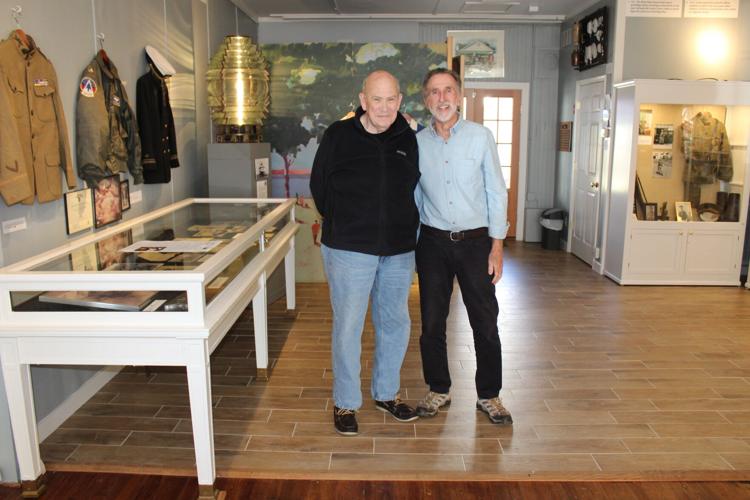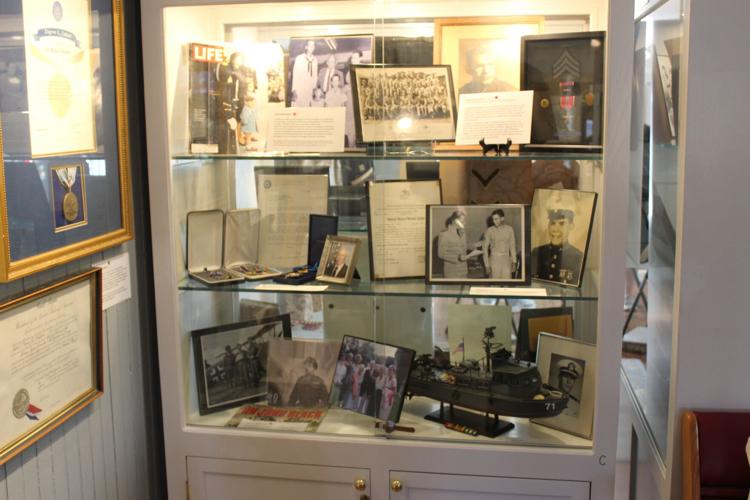OXFORD — The Town of Oxford is full of “amazing character,” according to the curator of the Oxford Museum Stuart Parnes, who decided to tell the stories of local characters through its most recent exhibit “Oxford Salutes its Veterans.”
The exhibit houses military uniforms dating back to World War II and Vietnam, relics from an undercover agent in Germany during the Cold War and so much more.
Parnes reached out to members of the community asking if they had any memorabilia they would like to showcase. He was overwhelmed by the response.
He went to the local veterans’ homes, heard their stories and gathered materials that veterans were happy to share.
“I was the one who called, followed up, went over to their houses and sat down with them. We chatted, and I met them and met their stories,” Parnes said.
He said he had no idea there were so many veterans in Oxford, particularly veterans who have lived such fascinating lives.
He shared a multitude of surprising and moving stories he learned along this journey, from a Cold War operative who stole a Russian license plate to a man who drove the ambulance carrying President John F. Kennedy’s body after his assassination at Dealey Plaza.
One of the veterans featured in the exhibit, Bill Dial, has been a resident of Oxford for 27 years. Dial served in the Vietnam War from October 1968 to October 1969. He served 31 years in the Navy, starting as an enlisted hospital corpsman for seven years with the Marine Corps before being commissioned as an officer.
He is 100% disabled due to service-related myelodysplastic syndrome, a cancer affecting his ability to produce red blood cells. Additionally, he said he has “rotten arteries” and has undergoing triple bypass surgery. He also sustained a traumatic brain injury from shrapnel.
Dial comes from a family with a strong military background. He grew up in Marianna, Florida near an Air Force Base where Dial was surrounded by World War II veterans. He said he was steeped in their war stories, which sparked his interest in the military and aviation.
Dial was stationed at Camp Lejeune from 1965 to 1966.
The U.S. Department of Veterans Affairs confirmed that between Aug. 1, 1953, and Dec. 31, 1987, Camp Lejeune’s water was toxic. The VA is allowing those suffering from diseases due to exposure to file for disability, though it is not an easy process and some veterans still demand justice, according to an article written earlier this month by MSN.
Dial and two of his brothers are victims of the toxic water. His two brothers developed Parkinson’s disease as a result of the exposure.
“Last I heard, there were 44,000 claims of people who have developed one of the 15 illnesses that are related to that,” Dial said.
Dial said Veterans Affairs has been good to him, but he attributes this to his medical background, which helps him navigate the system.
“The average guy does not know how to make the system work for him. And they can go to the VFW, or the American Legion, and there are people there that can help them,” he said. He said in addition to some not knowing the system, many veterans are afraid to ask for help.
Dial raised the the difficulty veterans on the Eastern Shore have getting healthcare due to a lack of full-service VA hospitals and a shortage of physicians. He recounted a personal crisis where he had to be helicoptered to Baltimore for an emergency endoscopy because no local specialist was available.
”Go sit in that VA clinic on a Monday morning. Those people that I talk about that don’t know how to work the system in their favor. It is a depressing experience,” Dial said.
After his service, Dial worked as an emergency planner for Talbot County for three years. This experience highlighted the broader lack of healthcare in the area and the difficulty of reaching vulnerable groups.
Stories like Dial’s are the reason Parnes feels the exhibit is so important.
”This is what’s gonna be lost. And so many of these guys were recently residents and are now gone. I mean, all the World War II guys, basically. So, we just keep missing them. They kept slipping through our fingers. And it’s not unique to Oxford, but when you scratch the surface, people are here,” Parnes said.
The exhibit “Oxford Salutes its Veterans” will be running through Nov. 18.













(0) comments
Welcome to the discussion.
Log In
Keep it Clean. Please avoid obscene, vulgar, lewd, racist or sexually-oriented language.
PLEASE TURN OFF YOUR CAPS LOCK.
Don't Threaten. Threats of harming another person will not be tolerated.
Be Truthful. Don't knowingly lie about anyone or anything.
Be Nice. No racism, sexism or any sort of -ism that is degrading to another person.
Be Proactive. Use the 'Report' link on each comment to let us know of abusive posts.
Share with Us. We'd love to hear eyewitness accounts, the history behind an article.